
Hugo de Sousa
Innovation Manager of BearingPointHugo de Sousa, an Innovation Management expertise is today one of the special guests at PARTTEAM & OEMKIOSKS Connecting Stories.
Hugo already co-created two companies and founded one, counting on more than 15 years of experience in Digital Transformation, Innovation and SI / IT.
He currently works at BearingPoint as an Innovation Manager where he helps organizations incorporate methods that enable them to innovate continuously and systematically.
Meet in exclusive, the brilliant course of Hugo Sousa.
1. Digital Transformation, Innovation and IS / IT are part of your daily life for more than 15 years, tell us a little about your professional path. What motivated you for these issues?
I started early with technology because of a neighbor of mine who had at the time an 80286, a spectrum as well as other gadgets very advanced and "expensive" for the height. I discovered that I liked technology and that my academic course had to go through.
Thus, at the age of 15 I entered the Gustave Eiffel Vocational School - at the time, one of the best in Portugal in vocational education - for the Informatics course. We had classes about 8 hours a day plus many more with challenges in the programming area. I at the time 15-16 knew more than my friends who were learning to program at IST.
I was fortunate to start working at the right place during my internship when I was 17/18. I went to Arthur D. Little, then one of the best consultants in the world. We were in the period before the "dot-com crisis" where we thought that having anything online would make us rich. So I had access to a working environment with access to technology, innovation and, above all, brilliant minds.
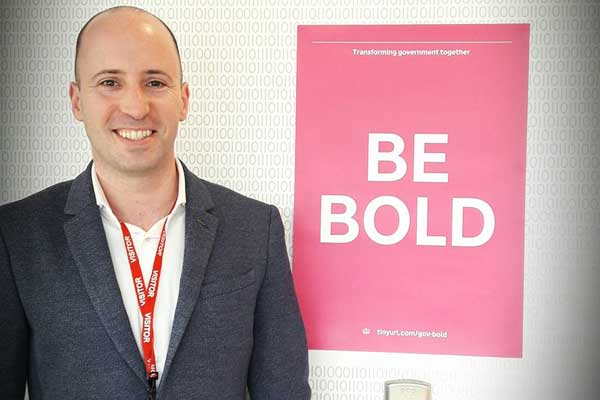
This led me to discover that I liked strategy, management and people. It led me to decide to enter a year later for the degree and to opt for Management IT since understanding of bits and bytes was not enough.
In short: I discovered that I was very interested in the interception of people, management and technology. And even better, I discovered that at the time there were few people who could speak these three languages and have the soft skills necessary to avenge in this area. Either there were technically very good people or very good people in the field of communication. Someone with a little bit of everything was rare to find and this was a differentiating factor that helped a lot to boost my career.
2. There is a growing need to monitor influencers, understand how to communicate and analyze new approaches. As an entrepreneur created a startup among other projects, what were the biggest challenges you encountered?
I have so far co-created two companies and founded one. The first was Netsystems around 2002, a company dedicated to managing networks and systems in Outsourcing.
When it was created, it was something innovative because only large organizations provided these services professionally. My focus was on the technical side. The company still exists today.
About 12 years later I decided to return to the world of entrepreneurship. At the time I had two options in mind: stop working two years and invest in an MBA outside of Portugal or learn, in practice, how to create a company from scratch. This time my focus was on the management component as well as the experimentation of innovative business models.
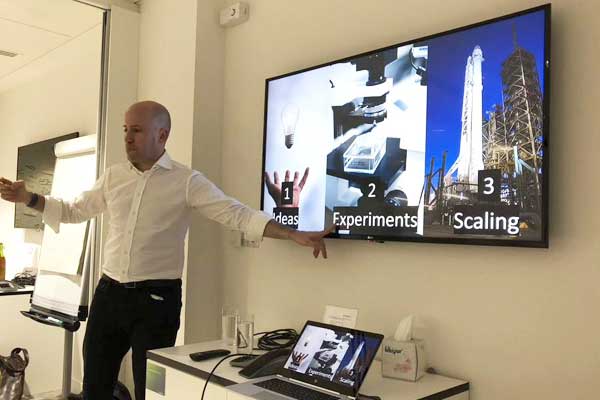
The project was started in Portugal (ALPHAPPL) and almost simultaneously in Romania (JADEMY). The problem that was addressed was the lack of software programmers through the rapid reconversion of unemployed from other areas. It had the proviso that the "students" only paid the "course" if they had a job at the end. Let's say I was a match-maker above all else.
The biggest challenges have been literally everyone: from recruiting talent to my team (everyone wants to say that they worked in a start-up but few are available for the sacrifices involved in a start-up), understand the complex fiscal dynamics, understand accounting and right and, above all, to manage some of the chronic problems in Portugal:
- the habit of not paying for services rendered or paying months / years later;
- the enormous dependence of the State and the "contacts" that one has or does not have;
- and the fact that some unemployed people (the target audience of the start-up) do not really want to work.
Another chronic problem I faced at the time was that IT companies wanted experienced IT Engineers at age 22 and, moreover, did not want to pay anything for it. What I had to deliver was people licensed in other areas and who for 14 weeks had learned the basics of some programming languages. This in 2013 was "groundbreaking", now it is acceptable since there are hundreds of code bootcamps around the world.
Curiously we find the same problems in Romania.
Also interestingly, the people that we put out of Portugal was a success. Not only did the companies pay us three times as much for the recruitment fee as they paid hours after the IBAN shipment.
Answering the question put to me I would say that the challenges were literally all. And I forgot to mention the bank that did not lend money to newly created companies, but at the same time, it financed Joes Berardos in millions in meetings that lasted less than 60 minutes.
3. You are currently working as an Innovation Manager at Bearing Point. What advantages does it offer for organizations to opt for this kind of innovative and agile solutions?
I help "old" organizations find new sources of growth as well as change their organizational culture. I encourage them to incorporate methods that allow for continuous and systematic innovation, with a high focus on the needs of their clients.
I work currently in the articulation of several methods, namely: Design Thinking, Service Design, Lean UX, Lean Startup, Design Sprint (as a Facilitator and workshop designer), MVPs, Design, Agile, Scrum, Kanban, Lean, Business Model Canvas, Platform Canvas, Pitch Canvas, Sense & Respond capability, DevOps, Continuous Delivery, Continuous Integration, Test-Driven Development, among others (frameworks, methodologies, approaches, ...).
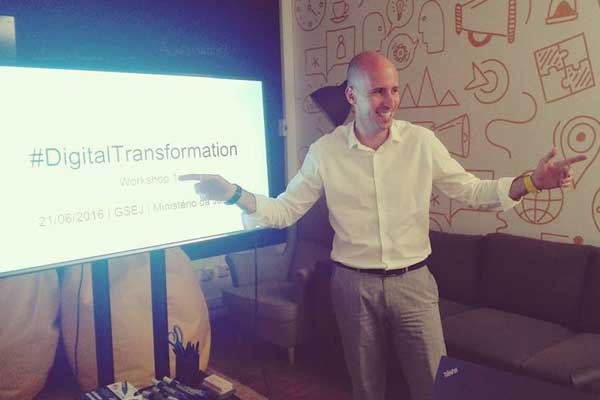
"Corporate innovation" or "corporate intrapreneurship" is still something new but with a potential for growth. Basically legacy organizations want to learn how start-ups work. They want to ensure that they remain relevant in the next decade.
I think again have found again an interesting area since there are very few people with corporate experience, consulting, private and public sector as well as entrepreneurship. Let's say I can wear a t-shirt or a suit and tie, as needed.
4. It was certainly unforgettable and a great honor to have participated in the project to improve the services of the Portuguese Public Administration. What are the benefits of this digital transformation for users?
It was a great honor and privilege to have worked in the Office of the Secretary of State for Justice, Anabela Pedroso. It was two years ago that I was fortunate enough to get to know the leading public organization on digital transformation - Government Digital Services UK - and to bring many of these lessons to Portugal.
The benefits we tried to bring to the Portuguese were essentially three:
- Ensure that we only invest in the services that make sense to the Portuguese culture of experimentation and rapid construction of services instead of long cycles of construction of products that almost nobody uses or likes;
- Improve user experience regardless of channels;
- Have the courage to bring disruptive approaches to solve problems with more than 50 years, as was the case of the Single Balcony of the Building a.k.a. BUPi where we crossed "data science" with "service design" and co-creation.
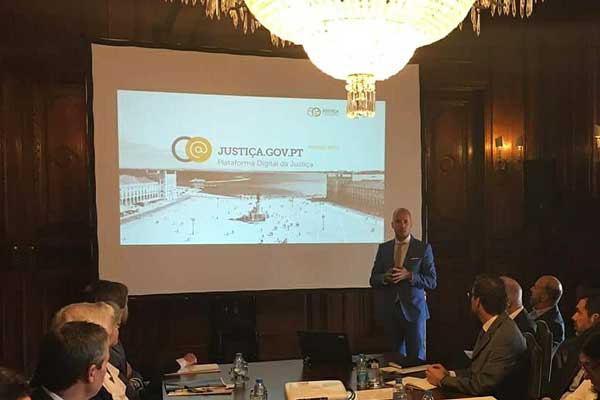
And we even try to redesign physical work spaces to improve the collaboration of people who work every day in court regardless of their contractual relationship. I think the "Justice Hub" will be news soon. I still started this project with me. I still remember the contact I made to UNIPLACES saying that "justice" liked to visit them. I think they were scared at the time.
I venture to say that the work done in justice will remain forever in the history of digital transformation and innovation of public services in Portugal. A game changer certainly.
5. Good ideas are hard to come by. What obstacles does an Innovation Manager find in your day-to-day life?
Ideas are easy to achieve. Everyone can get ideas. There are even methods to generate hundreds of ideas in a few minutes. The real challenge lies at the level of processes and, above all, the mentalities of organizations.
I think the "muscle memory" of organizations still dictates that the "CEO" is who should have ideas and everything else is there to follow. In modern dynamics, it is impossible for an organization to survive thinking in this way.
It is necessary that the organization has methods that enable everyone to systematically share their ideas. Next, you need a method for reviewing them as well as for experimenting with them.
On the basis of rapid and systematic experimentation it will be possible to find improvements in existing products and services and, perhaps, a future product or service that will guarantee the future and relevance of the organization.
6. Innovate the organizational model of the companies, in any way influence the perspectives of their employees?
What is innovation? I will assume that, in the context of this interview, innovation is any change that brings value.
Any change that is recognized by its target audience as something of value is certainly positive. Because you rarely know the impacts of a change, you have to make sure that you change a lot and often. It is critical that people understand why (why). What is the purpose of change, what is it intended to achieve, and how. What is the process.
And, in my view, employees should be an active part of all changes incorporating a "mindset" of experimentation, assuming that failure means learning. Assuming that it is great to "fail" as soon as possible as this allows you to reduce risk and, in general, avoid the irrelevance of the organization in the medium term.
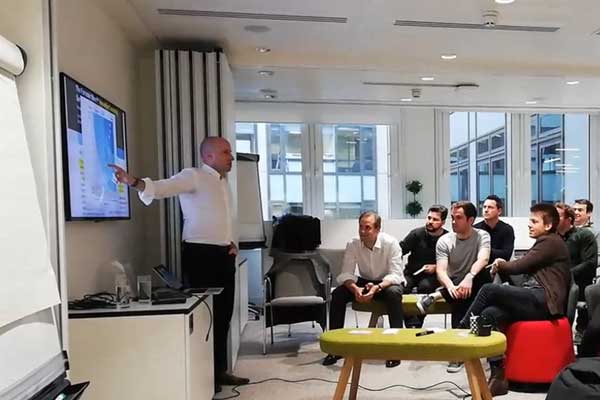
7. Innovation doesn´t mean interrupting, but rather improving. Why do you think companies have difficulty when it comes to innovation?
I created a blog (The Innovation Pub) to try to understand the different meanings of the word innovation.
I confirmed what I already thought - each person has its definition and this does not help when the company does not define what it means by innovation: will it be something disruptive? Is it an improvement on what already exists in terms of product? Will it improve the customer experience? Improve employee experience? All together?
We can call this strategy and not innovation. What is the vision? What is the strategy? It has to be clear to everyone. That's why I do not like to use the term "innovation strategy". I like to call it "strategy."
And there are new ways to execute a strategy - new forms that are now quite visible because organizations like Amazon, Netflix, Facebook. AirBNB, Uber, among many others, did not exist for 30 years and today are more valuable than many so-called "great" organizations with more than 150 years of history. It has changed the way they literally manage everything. Changed the very definition of what management is. And this scares a lot MBA ...
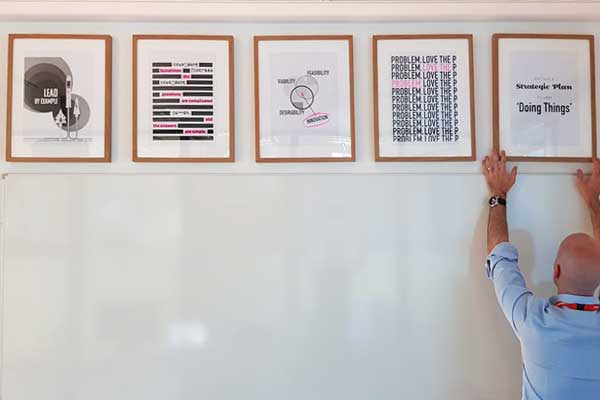
8. Among the various definitions of innovation we find today, what is yours? Can you give some examples? Among the various definitions of innovation we find today, what is yours? Can you give some examples?
I have essentially three that I use according to the context:
- Innovation is a change that brings value;
- Creativity is the ability to have ideas. Innovation is the ability to have ideas that bring value (payment or use by third parties);
- An organization should not "make innovation", it must innovate in everything it does.
9. Innovation is part of the DNA of PARTTEAM & OEMKIOSKS, that recently developed the NOMYU CITYLINK, a multimedia kiosk that revolutionized the traditional telephone booth, complemented by internet access, interactive displays and advertising. What is your opinion on this new paradigm of urban communication?
I confess that I have difficulty perceiving without trying. Could PARTTEAM & OEMKIOSKS send us a model to try out? It would look great on our "innovation lab".
10. PARTTEAM & OEMKIOSKS is a company that offers various technological solutions (digital mupis, multimedia kiosks for interior and exterior, self-service equipment, displays, software, etc.), what is your opinion about PARTTEAM & OEMKIOSKS?
PARTTEAM & OEMKIOSKS has had a fantastic and exemplary course. I met a PARTTEAM & OEMKIOSKS in 2011 that has nothing in common with what PARTTEAM & OEMKIOSKS is today.
I see that they seek to be at the forefront of everything they do and I do not mean just products and services, I am also talking about communication and marketing, as well as recruiting and retaining employees.
Obviously the work is due to a team but certainly a lot to Miguel who has led the company in an extraordinary dynamic and who always seeks to share what he learns with his network.
Miguel still has a Portuguese character - he likes to see others succeed. And this is obviously reflected in PARTTEAM & OEMKIOSKS.
Connecting Stories is a new editorial space led by PARTTEAM & OEMKIOSKS which consists of conducting exclusive interviews, directed at influential personalities who work in different sectors of activity.
The project, conceived by PARTTEAM & OEMKIOSKS, includes the publication of success stories, through small interviews with influencers who want to share details about their projects, opinions, plans for the future, among other subjects.
The idea is to connect stories, share knowledge, develop networking and generate content that can provide new visions, opportunities and ideas.
Founded in 2000, PARTTEAM & OEMKIOSKS is a world renowned Portuguese IT company, manufacturer of indoor and outdoor multimedia kiosks, self-service equipment, digital billboards, interactive tables and other digital solutions, for all types of sectors and industries. To know more about our story, click here.
